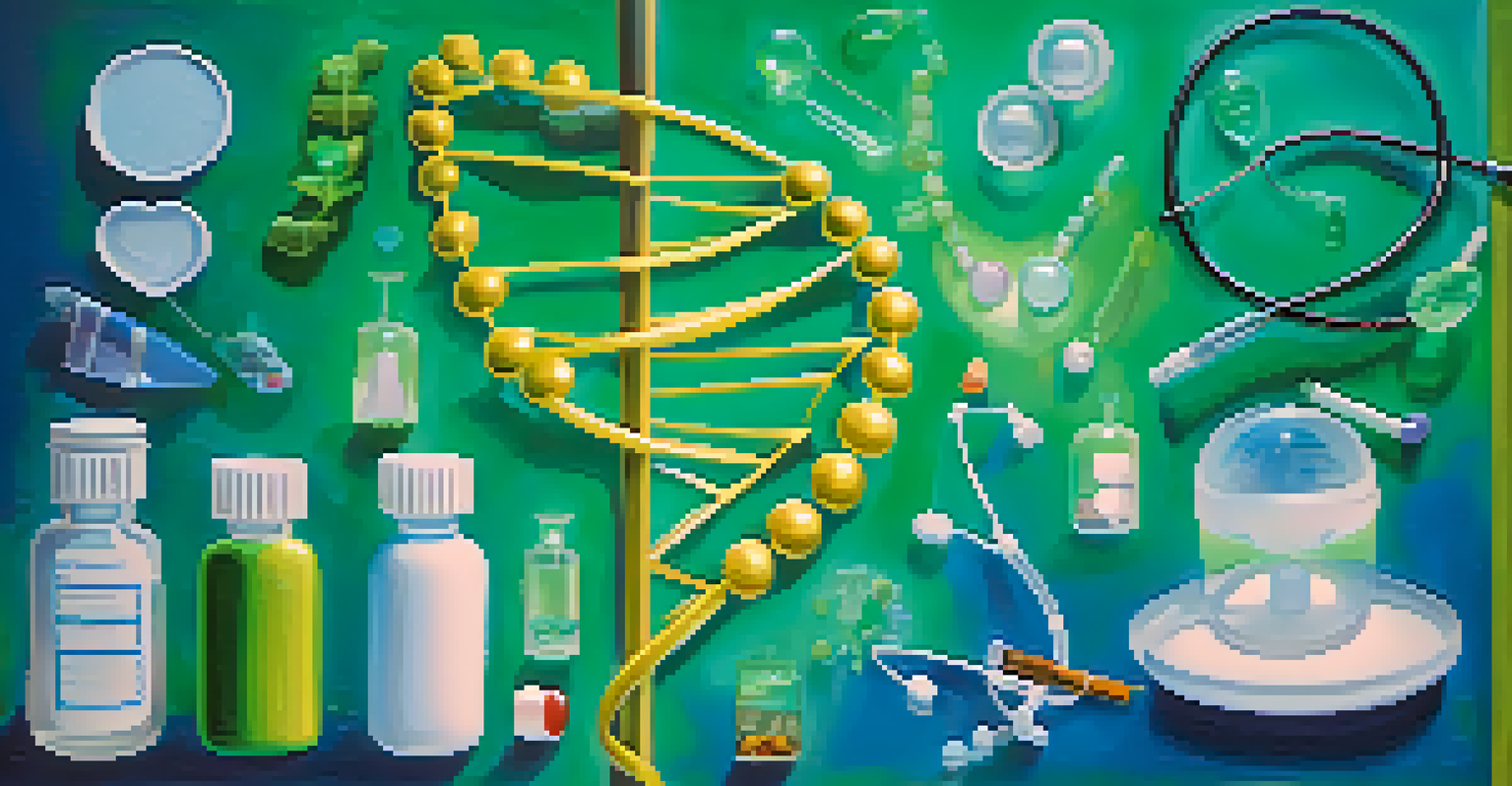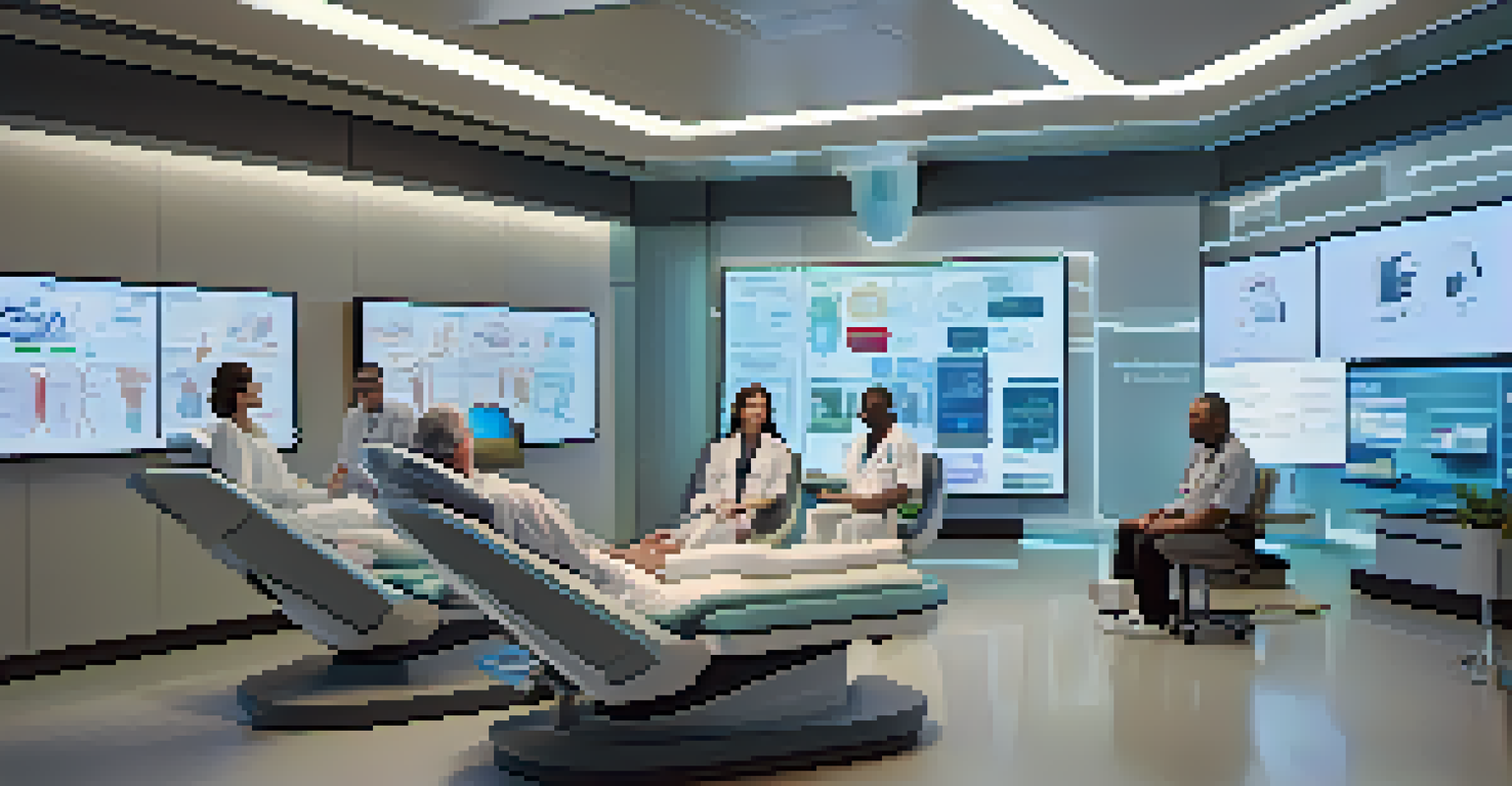Translational Medicine: Innovations in Drug Development Process

Understanding Translational Medicine in Drug Development
Translational medicine bridges the gap between laboratory research and patient care, transforming scientific discoveries into clinical applications. It focuses on turning basic science findings into new therapies, thereby enhancing the drug development process. By integrating various fields, translational medicine aims to expedite the journey from bench to bedside, ensuring that innovations reach patients faster and more efficiently.
Translational medicine is a bridge between basic research and patient care, ensuring that scientific advancements translate into tangible health benefits.
This approach not only improves the speed of drug development but also tailors therapies to meet individual patient needs. For instance, personalized medicine, a key component of translational medicine, utilizes genetic information to develop targeted treatments. This shift from a one-size-fits-all model to customized therapies highlights the potential of translational medicine to improve patient outcomes significantly.
Moreover, translational medicine promotes collaboration among researchers, clinicians, and industry professionals. This collaborative environment fosters innovation and allows for sharing of insights, ultimately leading to more effective drug development strategies. By working together, these stakeholders can address challenges and streamline the path from research to real-world applications.
The Role of Biomarkers in Drug Development
Biomarkers play a crucial role in translational medicine by providing measurable indicators of biological processes, diseases, or responses to treatments. They help researchers identify potential drug targets and assess the efficacy of new therapies during clinical trials. For example, using biomarkers can lead to more informed decisions regarding patient selection and treatment strategies, which ultimately enhances the drug development process.

In addition to improving the selection of candidates for clinical trials, biomarkers can also facilitate the monitoring of treatment responses. This allows for real-time adjustments to therapy, ensuring that patients receive the most effective interventions. By utilizing biomarkers, researchers can reduce the time and costs associated with drug development while increasing the chances of successful outcomes.
Translational Medicine Enhances Drug Development
Translational medicine accelerates the journey from laboratory research to patient care by transforming scientific discoveries into effective therapies.
Furthermore, the integration of biomarkers into the drug development process aligns with the principles of personalized medicine. By tailoring treatments based on individual biomarker profiles, healthcare providers can deliver more effective and safer therapies. This innovative approach not only benefits patients but also optimizes resource allocation within the healthcare system.
Advancements in Clinical Trial Designs
Innovative clinical trial designs are transforming the landscape of drug development within translational medicine. Traditional trial models often take years to yield results, but new strategies, like adaptive trials, allow for flexibility in response to emerging data. This adaptability can lead to faster decision-making and potentially quicker approval of new therapies.
AI is not just an option; it's a necessity for modern drug discovery, enabling faster and more accurate predictions than ever before.
For instance, adaptive trials enable researchers to modify trial protocols based on interim results, such as adjusting dose levels or even discontinuing ineffective treatments. This approach not only saves time but also minimizes patient exposure to ineffective therapies. By implementing these advanced designs, the drug development process becomes more efficient and responsive to patient needs.
Moreover, leveraging technology such as digital health tools and real-time data analytics can enhance the effectiveness of clinical trials. These tools provide valuable insights into patient behavior and treatment responses, enabling researchers to refine their approaches. As a result, the integration of innovative trial designs and technology is paving the way for more successful drug development outcomes.
Patient-Centric Approaches in Drug Development
A fundamental aspect of translational medicine is the emphasis on patient-centric approaches throughout the drug development process. This means actively involving patients in clinical trials and considering their perspectives when designing studies. By prioritizing patient needs and preferences, researchers can enhance recruitment and retention rates, ultimately leading to more robust data.
Engaging patients can also provide invaluable feedback on the treatment experience, helping researchers understand the real-world implications of their therapies. For example, patient-reported outcomes (PROs) can guide the development of drugs that not only treat diseases but also improve quality of life. This shift towards a patient-centered focus is reshaping how drugs are developed and evaluated.
Biomarkers Improve Treatment Precision
Biomarkers provide critical data for identifying drug targets and tailoring treatments, aligning with the principles of personalized medicine.
Additionally, fostering open communication between researchers and patients can build trust and encourage participation in clinical trials. By ensuring that patients feel valued and informed, the drug development process becomes more inclusive and effective. This collaborative approach not only accelerates innovation but also aligns with the ultimate goal of translational medicine: improving patient health outcomes.
The Promise of Artificial Intelligence in Drug Discovery
Artificial intelligence (AI) is revolutionizing drug discovery within the realm of translational medicine. By utilizing advanced algorithms and machine learning techniques, researchers can analyze vast amounts of data to identify potential drug candidates more efficiently. This technology has the potential to drastically reduce the time and costs associated with the traditional drug development process.
For instance, AI can predict how compounds will interact with biological targets, enabling researchers to prioritize the most promising candidates for further development. Moreover, AI-driven simulations can model disease pathways and treatment responses, providing insights that inform clinical trial design. This integration of AI into drug discovery not only enhances efficiency but also increases the likelihood of successful outcomes.
Furthermore, AI can facilitate real-time monitoring of clinical trials, allowing for swift adjustments based on patient data. This adaptability can lead to more personalized treatment approaches and improved patient experiences. As AI continues to evolve, its role in translational medicine will likely expand, further transforming the landscape of drug development.
Collaborative Ecosystems in Drug Development
Creating collaborative ecosystems is essential for advancing translational medicine and drug development. Partnerships among academic institutions, biotechnology firms, and pharmaceutical companies can accelerate the process of bringing new therapies to market. These collaborations enable the sharing of resources, knowledge, and expertise, ultimately enriching the entire drug development pipeline.
For example, public-private partnerships can drive innovation by pooling funding and research efforts to tackle complex health challenges. By working together, stakeholders can leverage each other's strengths and overcome obstacles that may hinder progress. This collaborative spirit fosters a culture of innovation, leading to more effective and timely drug development.
AI Revolutionizes Drug Discovery
Artificial intelligence streamlines the drug development process by analyzing vast data sets, predicting interactions, and enhancing clinical trial efficiency.
Moreover, engaging regulatory agencies early in the development process can enhance collaboration and streamline approval pathways. By aligning on goals and expectations, researchers can navigate the regulatory landscape more effectively. This synergistic approach not only benefits the stakeholders involved but also improves outcomes for patients who are eagerly awaiting new treatments.
The Future of Translational Medicine in Drug Development
The future of translational medicine holds immense promise for the drug development landscape. As technology continues to advance, we can expect even more innovative solutions that enhance the efficiency and effectiveness of bringing new therapies to patients. From AI-driven drug discovery to patient-centric trial designs, the evolution of translational medicine is set to transform how we approach health challenges.
Furthermore, as the healthcare landscape becomes increasingly interconnected, collaborative efforts will continue to play a vital role in advancing drug development. By fostering partnerships across sectors, we can harness collective expertise and resources to tackle the most pressing health issues. This collaborative approach will pave the way for groundbreaking discoveries and improved patient outcomes.

Ultimately, the integration of translational medicine principles will lead to a more streamlined and personalized drug development process. As we look to the future, embracing innovation and collaboration will be key to unlocking the full potential of translational medicine in improving global health.